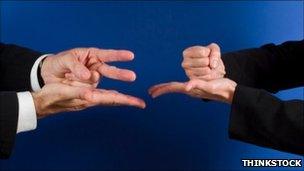Rock-paper-scissors gamers 'mimic each other'
- Published

Rock-paper-scissors can only be won when players do not carry out the same actions
Players of the "rock-paper-scissors" game unconsciously mimic the actions of their opponents, a study suggests.
The result is surprising because advantage is gained in the game by acting differently from opponents.
But research in Proceedings of the Royal Society B, external shows contests in which one player was blindfolded resulted in far more "draws" than chance predicts.
The authors say that in-built social aspects of behaviour must therefore be considered in economic and game theory.
At the root of the research is the idea that humans are prone to mimicking the behaviour and gestures of others, an idea called "automatic imitation".
The effect has been widely studied in the context of "mirror neurons" - purported to be the brain cells that control mimicry behaviour.
What has remained unclear is whether automatic imitation can be consciously overridden when its effects are detrimental.
"Lots of people have shown before that this automatic imitation is automatic in the sense it's unconscious," said Richard Cook, lead author of the study from University College London.
"But no one has really ever addressed the extent to which it's hard to inhibit," he told BBC News.
Mr Cook and his co-authors - including cognitive scientists, psychologists and economists - chose rock-paper-scissors as the perfect test; only by choosing differently from one's opponent is there a chance of winning the game.
Chance encounters
The team ran two sets of rock-paper-scissors contests: one for which both the players were blindfolded, and one with just one player was blindfolded. Each pair of participants played nine matches of 20 rounds each, with a small cash prize for the overall winner.
In a normal round of the game - without any behavioural influence - random chance predicts a one-in-three possibility of a draw, in which both players play the same thing.
The rounds between blindfolded players showed exactly this pattern; 33.3% of the time, there was a draw.
However, when just one player was blindfolded, the number of draws rose to 36.3% - not a large difference, but a statistically significant one.
Further tests examining the reaction times of the sighted players showed that when the blindfolded player played "rock" or "scissors" just slightly earlier, the sighted player was more likely to play the same.
Mr Cook said that because of its universality among humans, automatic imitation was something like a conditioned response.
"We think that the response of the mirror system is configured by the nature of early experiences in life," he explained.
"Because you have so much experience of being imitated, of seeing the products of your own actions, it's difficult to resist - even when it's in your best interests."
Christian Keysers, head of the Social Brain Laboratory at the Netherlands Institute for Neurosciences, said that the work adds to prior studies on the effects of automatic imitation, including a study in the journal Acta Psychologica, external by Wolfgang Prinz of the Max Planck Institute for Psychological Research in Germany and colleagues.
That work showed that hints of automatic imitation affected response times in a finger-moving task.
"The previous studies mainly focused on the fact that seeing someone else do something interferes with your own task and slows you down," Professor Keysers told BBC News.
"What is new here - and quite exciting I think - is that the effect really goes towards tipping the balance to a different move altogether."
Professor Prinz said that the drive to imitate has its limits, however.
"The fact that there is a spontaneous and initially irresistible tendency to copy does not say that this tendency cannot be overcome, and hence resisted, after a short while," he told BBC News.
"Our ability and propensity to imitate is certainly important for our social life, particularly in early infancy. Yet, likewise important is our ability to suppress these spontaneous tendencies. Life would be quite strange if we copied each other all day long, wouldn't it?"